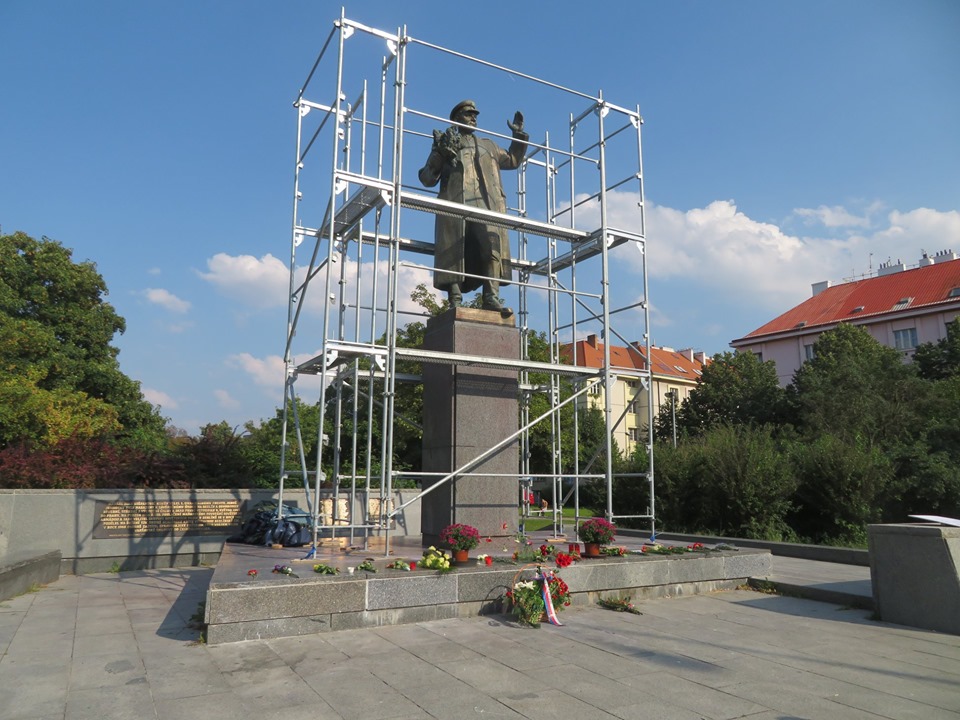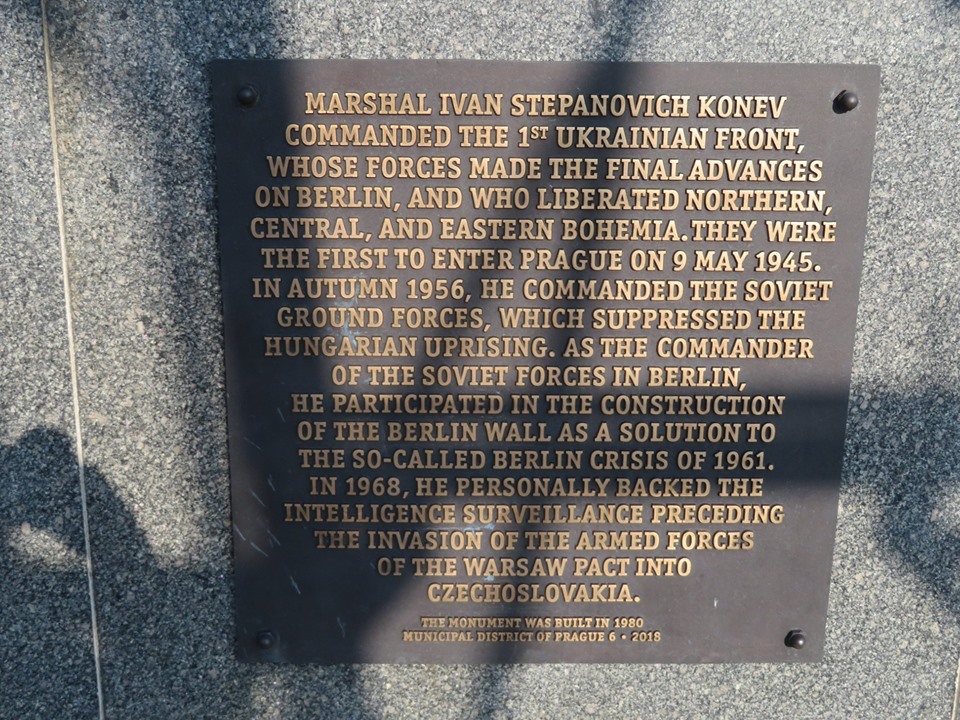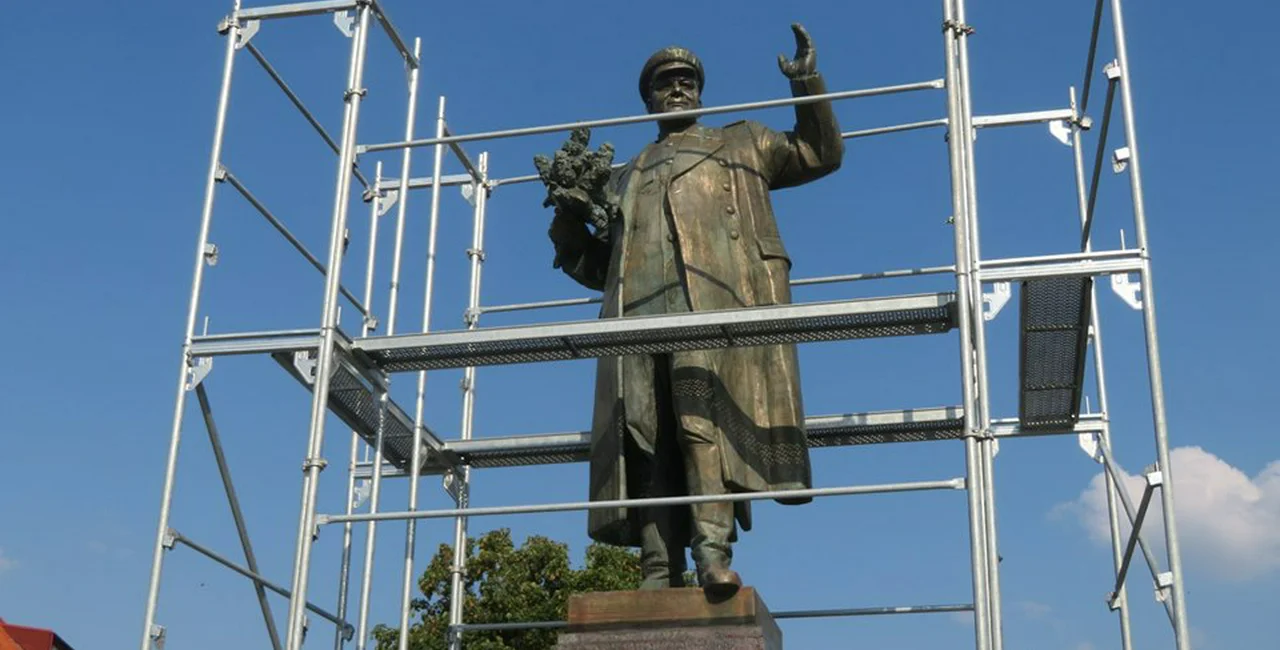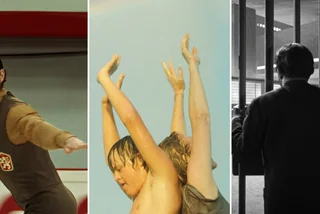The statue of Soviet Marshal Ivan Konev in Prague 6 has become a focus of controversy again. Currently it is behind a scaffolding for its own protection, but a tarp that kept it from view has been removed by members of the public, only to be replaced, removed and replaced again.
The Prague 6 district plans to discuss the fate of the statue on September 12. In the past, the district has offered the statue to the Russian Embassy, which is also located in Prague 6, so it can be displayed on the grounds there, but the offer has not been accepted. The statue has also been offered to several museums.
An unauthorized rally in support of the statue took place September 2, with several speakers calling for statue to be uncovered again. The rally, which attracted some 300 people, was organized over Facebook by a group called Against Covering the Statue of Marshal konev (Proti zakrytí sochy maršála Koněva). Jana Volfová, a former ČSSD deputy and chairwoman of the Czech Sovereignty party, organized the rally. She said she was against rewriting history.
Prague Castle spokesman Jiří Ovčáček picked up on the theme. “We reject the rewriting of history, we reject those who try to spread hatred in society,” he said, crediting Konev with liberating the Auschwitz concentration camp. While Soviet troops under his broad command liberated the camp, he was not directly involved and had no knowledge of the camp before its discovery. Ovčáček made an analogy between the fences at the camp and the fence around the statue.
Za chvíli začínáme.
— Lubomír Volný (@lubomir_volny) September 2, 2019
Maršál Koněv a sovětští vojáci vstoupili v květnu 1945 do Prahy jako osvoboditelé.
Pražané jim byli v roce 1945 vděčni.
Kde se bere dnešní zbytečná nenávist a agresivita jejich vnuků a dětí mi není tak úplně jasné. pic.twitter.com/MhkEMJHwZR
He accused Prague 6 Mayor Ondřej Kolář (TOP 09) of spreading hate by opposing the rally. In a statement before the rally, Kolář called supporters of the statue “extremists” who were “almost blinded by love of Russia.”
Parliamentary Deputy Jaroslav Foldyna (ČSSD) said that the monument had not bothered anyone for 30 years but has now become an issue. He added that supporters of the statue were not political extremists, in his opinion. The event ended with a collection of money to pay the fine for the unauthorized gathering.
Marshal Konev played a key role in liberating Prague from German occupation at the end of World War II, which made him a hero during the communist era.

His later involvement in suppressing the 1956 uprising in Budapest, the building of the Berlin Wall, and the Warsaw Pact invasion of Czechoslovakia have called his legacy into question.
The recent flaring up of events started when vandals covered part of the statue in red paint on August 21, the 51st anniversary of the Warsaw Pact Invasion. The phrases “No to the Blood Marshal” and “We will not forget” were painted on the pedestal, along with several dates.
Prague 6 Mayor Kolář declined to have the district pay to clean the statue, saying he saw no reason to “polish the boots of the Russian general over and over again.” The statue has been vandalized several times in the past, with cleaning costs adding up to over 1 million CZK. Unlike some war memorials, this one is not protected by international treaty.
The graffiti was removed, but not by the district. The police know the identities of the cleaners but plan no charges as there was no criminal intent.
The Russian Embassy to Czech Republic on Facebook said it considers the conduct of the Prague 6 district leadership in “hiding” the statue under a tarp to be “a repeated disgrace to the Red Army soldiers killed in the freedom fight against the Nazis.” The statement went on to imply that Prague 6’s leadership may have preferred a different outcome to World War II.
“We are convinced that in the Czech Republic people behave with great respect to the memory of soldiers and officers of the Red Army who fought Nazism during World War II. We are sorry that we cannot say about the management of Prague 6,” the Russian Embassy said, adding that it had received letters of support from the Czech public.
Prague 6 on its Facebook page asked the public for patience. They denied hiding the statue, and said the scaffold and tarp were for protection of the monument while further steps were planned, such as an anti-graffiti coating. “The scaffolding around the Konev statue is not a ‘hurrah’ action; on the contrary, it has several purposes, all of which are to protect it,” the Facebook post said.
Comments under both Facebook posts were mixed, and Prague 6 Mayor Kolář said he and his staff have received threats over the phone and even angry visitors to the Town Hall. The authenticity of the social media comments could not be verified, and Russia has been accused recently of manipulating social media to sway public opinion on a variety of issues.

Negative attitudes toward the statue last year, the 50th anniversary of the 1968 Warsaw Pact invasion, led to the placement of three bronze plaques on the statue’s base. The English version points out Konev’s role not only in liberating Prague but in the Budapest uprising, Berlin Wall, and 1968 invasion. The Russian Embassy objected to the plaques, calling them “provocative” and “barbaric.”
The statue by sculptor Zdeněk Krybus was erected May 9, 1980, on the 35th anniversary of the liberation of Prague, and it depicts a larger-than-life Konev with a bouquet of flowers.
This is not the only controversy involving Konev. A plaque in Old Town Hall was removed during the renovations leading up to the October 2018 celebrations of the 100th anniversary of the founding of Czechoslovakia. There are no plans to return the plaque to its original location. The Russian Embassy called this an attempt to rewrite history.
The Prague 3 district has a street named after Konev, and is also contemplating changing the name, though this would require all residents and businesses on the street to update their documents.












 Reading time: 4 minutes
Reading time: 4 minutes 





























